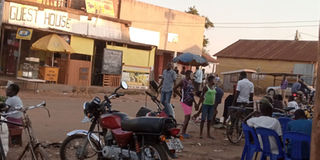Why youth face sexual exploitation in Lira City

Teenage girls at a bar in Lira City last week. Many girls flock the city for commercial sex. PHOTO | BILL OKETCH
Civil society actors have appealed to local leaders in Lira City to work together to address the negative effects of rural-urban migration.
According to leaders, hundreds of young girls who flock to the city in search of economic opportunities are sexually exploited.
Majority offer sex in exchange for accommodation and food while others charge their clients as low as Shs500.
Mr David Akora Bua, the chairperson of Junior Quarters ‘A’ in Lira City West Division, said recently three girls asked him to pay them Shs2,000 for sex.
“They asked me what I wanted around their spot and before I could respond, they asked me whether I had Shs2,000,” Mr Akora told a meeting at Lira City West Division Council hall on Friday.
The meeting was organised by GAIN-Uganda in partnership with Lira NGO Forum.
Mr Dicken Ogwal, the executive director of Lira NGO Forum, said some of the youth are desperate.
“Somebody has come from Otuke to start a new life in town, he or she has no friends; you want to eat food, get a house to sleep in and the things are not there. What do you do? Many of us are victims of rural-urban migration but we have survived through it,” Mr Ogwal said.
GAIN-Uganda’s programme manager, Mr Samson Okurut Emasit, noted that the problem is widespread.
“You find that people come from Alebtong, Otuke, Dokolo to Lira. Before you know it, they are in Corner Kamdini, Masaka, Abu Dhabi and so on,” he said
According to Mr Okurut, many youths run away from productive areas, leaving the elderly to fend for themselves.
“Maybe that is why we have famine and hunger. So, we are going to interrogate those narratives and address them,” he said.
Mr Edwin Odur, a cultural leader, said people migrate to town because of prestige, social and economic reasons.
“Let not talk only about people who are in the villages. Even people who are in towns are not satisfied with their life. Why do we have government officials seeking medical services out of the country? That shows we have a problem,” Mr Odur said.
“There are people who have gone to take care of others outside the country and they have never come back, others have gone for performances and sport activities but have never returned,” he added.
The Rev Shadrack Ogwal, the curate of Lira City-based All Saint Obanga Pewany Church, said it is an indication that people have left the way of God.
“Some people do not want to go back to the village because of spirituality. When children and young people go back to the village, they start experiencing strange things like witchcraft which discourages them from settling in the village,” he said.
Mr Ocari Dyangcal, the city male councillor representing the elderly, said community responsibility no longer exists. “Community used to care for every child. If I found a child walking on the street doing a wrong thing, I would have the right to beat them but we now have children’s rights. So, you may watch an event unfold and fail to act on it,” Mr Dyangcal said.
He also faulted the Church for abandoning its responsibility.
“With many emerging churches, people are just fighting for followers, but what do we do with them? How do we prepare them to do good things in their communities?” Mr Ocari asked.
He also challenged political organisations to play their role.
“If your intention is to serve this nation and serve it well, do you preach the gospel there? No, we are not doing it. So, this is how far the country has gone.”
Ms Sharon Eyotaru, a teacher, said leaders should promote agriculture among the youth so that they take it up as a source of livelihood.
Unicef estimates that nearly one in four migrants in Africa is a child, more than twice the global average.
8 million plan to migrate to urban areas
One in five Ugandans or 20 percent of rural dwellers are considering migrating to urban areas in the next five years, according to a 2021 study instituted by Friedrich Ebert Stiftung.
The study, which was conducted by Hatchile Consult, found that close to eight million Ugandans plan to migrate to urban areas, citing varying reasons.
At least 35 percent or 2.8 million of these, the study found, are considering Kampala as the most likely destination while 54 percent or 4.32 million are likely to migrate to other urban centres, among them the recently created cities and townships spread across Uganda.




